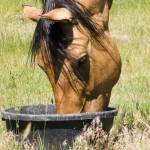Feed Enzymes: Glycemic Response, Hindgut Acidosis in Horses

Partial digestion of carbohydrates, including starch, in the small intestine of horses can cause a swell of fermentation in the hindgut, which can lead to hindgut acidosis, colic, and even laminitis. Could feed enzymes increase digestion in the small intestine and reduce problems in the hindgut? This question served as the basis of a recent Australian study.*
“Enzyme additives are used extensively in livestock feeds to enhance digestion of certain nutrients. Common enzymes include carbohydrases and proteases, which help break down carbohydrates into simple sugars and proteins into amino acids, respectively,” explained Catherine Whitehouse, M.S., a nutrition advisor at Kentucky Equine Research.
In the study, Standardbred geldings, each acting as his own control, were fed varying amount of oats, either 0.5 kg, 3 kg, or 6 kg per 500 kg of body weight and a multi-enzyme supplement over a 72-day period. Calcium carbonate and a protein and mineral balancer pellet were added to all diets, and copra meal was added to the smallest oats meal. Each dietary period was 23 days, consisting of a 10-day adaptation period, a three-day fecal collection, a seven-day diet period, and then another three-day fecal collection. Glycemic response was measured on the final day of each collection period. Blood samples were collected for glucose analysis prior to the morning feeding, at 30-minute intervals for four hours, and then hourly for four hours. Researchers measured dry matter, organic matter, nitrogen, starch, neutral detergent fiber, and acid detergent fiber digestibility.
“Feed enzymes did not increase dietary digestibility when horses were fed these oat-based diets. Little starch was noted in fecal samples, and fecal pH decreased as the oats in the diet increased. Feed enzymes did not modify glycemic responses,” explained Whitehouse.
The feed enzymes used in this study are typically fed to hogs and poultry, whose diets contain more wheat and sorghum, so future studies in this field should focus on an enzyme blend that best complements typical equine diets.
“Hindgut acidosis continues to be a problem in performance horses, as they must often consume large concentrate meals in order to adequately fuel athletic endeavors,” she said. “To counteract the drop in pH that characterizes this syndrome, horse owners can turn to EquiShure, a time-released hindgut buffer. EquiShure features encapsulation technology that allows for targeted delivery of sodium bicarbonate to the hindgut. Feeding straight sodium bicarbonate simply won’t help the hindgut environment.”
Are you feeding your performance horse the right way? Do you have a question about how much feed is too much feed? Contact the nutrition consultants at Kentucky Equine Research today!
*Lilly, L.J., S.R. Hass, X. Li, P. Isherwood, D. Zhang, E.A. Owens, A.J. Cawdell-Smith, and W.L. Bryden. 2018. Digestion by horses of oats-based diets supplemented with feed enzymes. In: Proc. Australasian Equine Science Symposium 7:35.








